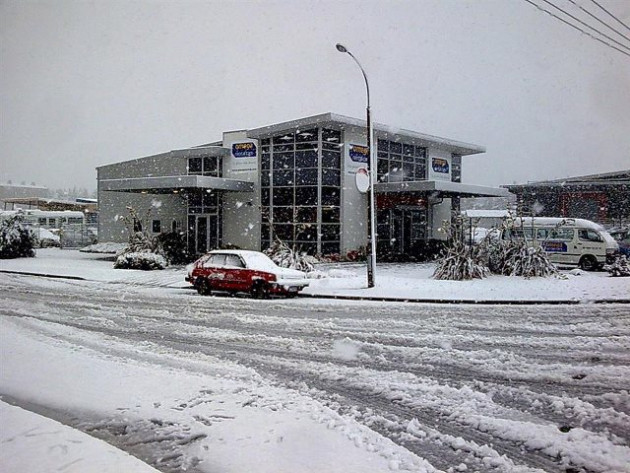Winter Roads - Beware Black Ice
Navigating winter conditions on South Island roads requires awareness and caution, particularly regarding the notoriously dangerous phenomenon — black ice.
Black ice forms when moisture from fog, light rain or melted snow on the road drops to 0 degrees or lower. When the air temperature drops below freezing, any moisture on the ground will freeze and form a thin, highly transparent, slippery and dangerous layer of ice. Any existing ice or snow on the ground will slowly melt when the temperature rises the following morning. The water can then re-freeze overnight, leading to hazardous driving conditions and an increased risk of car accidents. This thin ice layer blends seamlessly with paved surfaces—which is why it’s called ‘black ice’.
When is there black ice in New Zealand?
You’ll find black ice in areas with sub-freezing temperatures. Common locations include the Southern Alps and frost-prone regions like Otago and Southland.
This thin, highly transparent ice layer is often found in corners shaded by trees or other objects since they receive less warmth from the sun during the day. Black ice is also common on bridges and overpasses – where the elevation allows cold air to flow under the surface of the road and lower its temperature.
How do you detect black ice? Look for:
- Dark, glossy patches on the footpath or road surface, especially in shady spots.
- Other drivers braking or manoeuvring with extra care.
If you’re planning on driving, clear any overnight condensation from your car windows. If black ice has formed on the road pavements, you’ll have optimal visibility to react promptly to any hazards. Wait for the sun to warm up the roadways and melt the ice whenever possible.
While driving on snow allows some traction, black ice offers none. If you suspect black ice on your road surfaces, keep plenty of distance — more than you usually would in inclement weather.
Avoiding black ice risks
Driving in New Zealand is relatively easy compared to many other countries, sometimes leading us to become complacent and overlook potential hazards. It's important, however, to remain aware of the risks.
If your flight arrives late at night, consider delaying some or most of your driving journey until the next day. We understand the desire to maximise your time on the road or the slopes, but we've witnessed numerous instances where customers fly into Christchurch at midnight and proceed to drive straight through to Queenstown. Unfortunately, fatigue, black ice and unfamiliar roads can contribute to a higher risk of collisions.
What do you do if you find black ice on the road? If you hit a patch of black ice, try to keep calm. Braking causes the car to slide, especially if you brake too hard. Instead, ease your foot off the accelerator and keep your steering wheel straight to avoid sliding and losing control. Gradually reduce speed and let the vehicle stop on its own if you have enough room ahead.
Responding to black ice incidents
If you encounter a black ice-related accident, here are a few tips:
- Slow down and approach the area with caution, keeping a safe distance. Turn on your hazard lights to alert other drivers.
- If the accident involves injuries or significant damage, dial 111. Follow instructions and provide any assistance you can.
- If you have first aid training and it's safe to approach the scene, check if anyone requires immediate medical attention. Offer assistance within your capabilities.
- Remain calm, patient and respectful towards others. Support and reassure those affected by the accident while waiting for help.
Remember, your safety should always come first. If you feel uncomfortable assisting, wait for emergency services.
Help keep New Zealand roads safe!
Understanding the risks of black ice and how to respond can make a significant difference in navigating challenging conditions on wet roadways in New Zealand.
Share these tips with friends and family to promote safer journeys!
Book great rental vehicle deals with Omega today – and find even more valuable advice and road trip ideas on our blog.
Have a safe and happy journey this winter and let the only bruises be incurred on the slopes!




